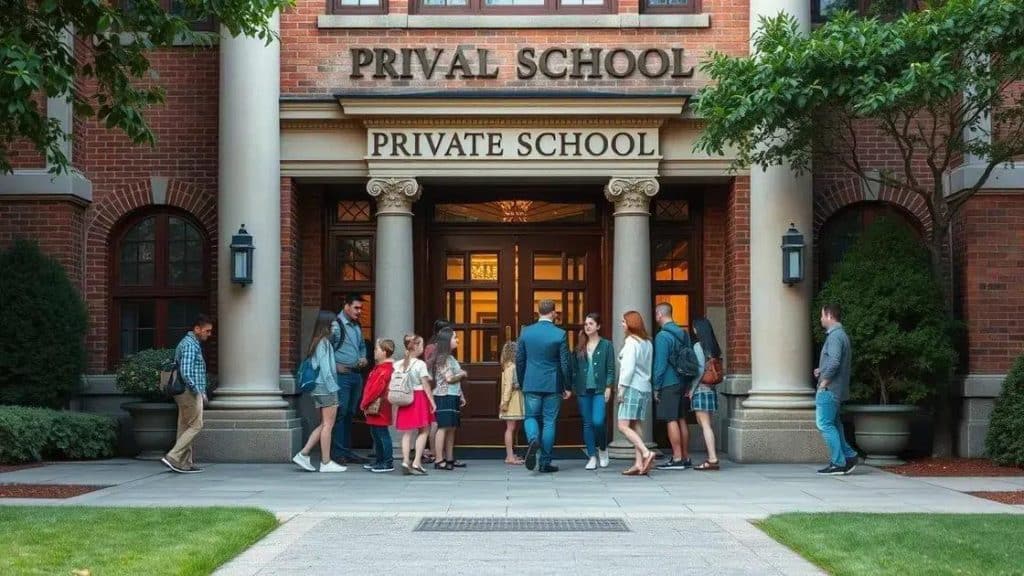Blood private school access: what you need to know

Blood private school access refers to the advantages some families have in securing admissions based on legacy connections and alumni status, making it crucial to understand the associated factors and explore alternative educational paths.
Blood private school access seems like an elusive topic for many parents. How do you ensure your child gets the best education possible in a competitive environment? Let’s uncover what this really means.
Understanding blood private school access
Understanding blood private school access is key for many families seeking top-notch education. This exclusive world often seems daunting, but knowing the ins and outs can make all the difference.
What Does Blood Private School Access Mean?
Essentially, blood private school access refers to the advantages some families have in gaining admission to elite private schools based on legacy or familial connections. These institutions often prioritize applicants who have parents or grandparents who attended.
Key Factors Influencing Admission
Several elements can influence your chances of gaining access:
- Legacy status: Having alumni in the family can enhance your application.
- Recommendations: Strong endorsements from influential community members can help.
- Involvement: Participation in school events can display your commitment and interest.
Alongside these factors, being proactive in your child’s education journey plays a crucial role. Each step, from school visits to open houses, can strengthen the application. Understanding the school’s culture and values also helps align your child’s strengths with the school’s mission. It’s vital to highlight your child’s achievements and how they complement the school’s ethos. After all, schools look for students who are not just academically qualified but also aligned with their vision.
Another aspect to consider is the application process itself. Many elite private schools have unique requirements that go beyond report cards. This may include interviews, essays, and even assessments. Being prepared means understanding what each school seeks in its candidates.
Additionally, the financial aspect cannot be overlooked. Scholarships and financial aid are often available, but understanding the process and deadlines is essential. This knowledge can significantly impact your family’s ability to afford education at a blood private school.
As you navigate blood private school access, remember that being informed is your best weapon. Engage with other parents, attend informational sessions, and research extensively. The goal is to equip yourself with the knowledge necessary to advocate for your child’s education effectively.
In summary, understanding blood private school access requires a multi-faceted approach that encompasses family legacy, active engagement, thorough research, and financial planning. By addressing these aspects holistically, you can enhance your child’s chances of gaining entry to the school of your choice.
The benefits of blood private schools
The benefits of blood private schools are numerous and can significantly impact a child’s educational journey. These institutions often provide a unique environment that fosters academic achievement and personal growth.
Customized Education Experience
One of the main advantages is the tailored approach to education. Smaller class sizes in blood private schools allow for more individualized attention from teachers. This means that students can receive help suited to their learning style, fostering better understanding and retention of material.
Strong Academic Programs
Blood private schools typically offer rigorous academic programs that prepare students for higher education. Many institutions emphasize advanced placement courses and other enrichment opportunities.
- High Standards: These schools often have strict academic standards that promote excellence.
- College Preparation: Many blood private schools focus heavily on preparing students for college entrance exams.
- Extracurricular Activities: From sports to arts, there are many options to enhance student experience.
Beyond academics, students often develop critical life skills in blood private schools. They learn to manage their time effectively, work collaboratively in teams, and develop a sense of responsibility. These skills are crucial for success both in school and in life.
Moreover, attending a blood private school can enhance networking opportunities. Families are often connected through shared values and goals, creating a community of support. This connection can lead to internships, mentorships, and college recommendations that benefit students immensely.
In addition, many blood private schools prioritize character development and ethical decision-making. Schools often integrate values education into their curricula, fostering a strong moral compass among students. This holistic approach prepares them for challenges beyond academics.
Tips for gaining access to private institutions

Gaining access to private institutions, particularly blood private schools, requires strategic planning and execution. Understanding the application process can significantly improve your chances.
Start Early
One of the best tips for gaining access is to start the process early. Research schools well in advance to familiarize yourself with their requirements and deadlines. By collecting necessary documents ahead of time, you can avoid last-minute stress and ensure a comprehensive application.
Visit Schools
Visiting schools provides valuable insights. It allows parents to understand the environment and culture. Meeting with teachers and administrators can also create a personal connection. A great way to show interest is by attending school events or open houses.
- Engage with the community: Interacting with other parents and current students can offer insights about the school.
- Ask questions: Inquire about programs, extracurricular activities, and values to see if they align with your child’s needs.
- Follow up: After visits, send thank-you notes to show appreciation and reinforce your interest.
Another important aspect is to ensure your child highlights their strengths. When applying to a blood private school, showcase achievements in academics, sports, or arts. Including personal anecdotes in the application can give a clearer picture of your child’s character and values.
Paying attention to the application details is crucial. Ensure all forms are filled out accurately and submitted on time. Missing a deadline or making simple errors can hurt your child’s chances of admission. It’s a good idea to have someone else review the application for clarity and completeness.
Lastly, be prepared for interviews. Many blood private schools require interviews as part of the admissions process. Practicing common interview questions with your child can help them feel more confident. Remind them to express their enthusiasm for the school and be themselves.
FAQs about private school admissions
FAQs about private school admissions can help demystify the process for many families. Understanding common questions can ease concerns and guide decisions.
What is the application process like?
Each private school has its own specific steps. Generally, the process involves submitting an application form, paying an application fee, and providing necessary documents. These may include previous report cards, recommendations, and standardized test scores.
When should I start the application?
It’s best to start early. Many families begin researching schools as early as a year in advance. This allows time to gather documents and meet deadlines.
- Research schools: Know their admission requirements and deadlines.
- Visit schools: Attend open houses or tours to get a feel for the environment.
- Talk to current families: Their experiences can provide valuable insights.
What are schools looking for in applicants? Private schools typically look for a combination of academic achievement, personal character, and extracurricular involvement. Demonstrating a passion for learning and participation in school activities can strengthen an application.
Many schools conduct interviews as part of the admissions process. These interviews provide an opportunity for parents and students to showcase their interests and ask questions about the school. It’s important to prepare by discussing common interview questions and practicing responses.
Another frequent inquiry is about financial aid options. Many private schools offer scholarships or financial aid to help families afford tuition. Understanding the financial aspect is crucial and families should not hesitate to ask schools about available resources.
Lastly, parents often wonder how long the admissions process takes. After submitting applications, schools typically take a few weeks to review them. Decisions are communicated through letters or emails, and it’s essential to adhere to timelines to ensure smooth admissions.
Alternatives to traditional private schooling
Exploring alternatives to traditional private schooling opens up new opportunities for families. There are many options available that can provide quality education outside the conventional private school model.
Charter Schools
Charter schools offer a unique blend between public and private education. They are publicly funded but operate independently. This means they have more flexibility in their curriculum and often focus on specific educational philosophies or teaching methods, such as arts integration or STEM education. Families like charter schools because they tend to have smaller class sizes and innovative teaching approaches.
Homeschooling
Homeschooling is becoming increasingly popular. Parents choose this route to have complete control over their child’s education and customize learning based on their child’s interests and pace. Homeschooling allows for flexibility in scheduling and the opportunity to incorporate experiential learning, such as field trips and hands-on projects.
- Curriculum choices: Parents can select from various resources and curriculums that fit their child’s learning style.
- One-on-one attention: Children can receive personalized guidance, focusing on their strengths and weaknesses.
- Community involvement: Many homeschooling families join co-ops or groups for social interaction and shared resources.
Online education is another alternative. Many platforms now provide comprehensive online courses that cover a wide range of subjects. This option gives students the freedom to learn at their own pace. Online learning can include interactive lessons, videos, and virtual classrooms. It offers flexibility for families who may travel frequently or need a non-traditional learning schedule.
Cooperative education, or co-ops, is a model where families come together to educate their children in a group setting. Parents share the teaching responsibilities and resources. This approach often combines the benefits of homeschooling with the social advantages of traditional schools. Children benefit from diverse teaching styles and varied social interactions.
Finally, alternative education models, such as Montessori or Waldorf schools, provide unique methodologies that promote holistic development. These schools focus on fostering creativity, critical thinking, and emotional growth rather than just academic achievement. Students engage in hands-on learning and experience-based education that prepares them for real-world situations.
In conclusion, choosing the right educational path for your child involves exploring various options. Blood private schools provide numerous benefits, but alternatives such as charter schools, homeschooling, and online education offer valuable choices as well. By understanding what each option entails, families can make informed decisions that best suit their child’s needs and learning style.
It’s essential to consider your child’s interests and strengths while also evaluating the school’s values and teaching methods. With the right research and support, you can find the perfect fit for your child’s educational journey.
FAQ – Frequently Asked Questions About Private School Admissions
What are the main requirements for applying to private schools?
Most private schools require an application form, application fee, previous report cards, and recommendations.
How does the admissions process differ from public schools?
Private schools often have their own specific admission criteria and may place a stronger emphasis on factors like interviews and essays.
Can I receive financial aid for private schooling?
Yes, many private schools offer scholarships and financial aid programs to help families cover tuition costs.
What should I prepare for a private school interview?
It’s important to prepare your child by discussing their interests, strengths, and encouraging them to ask questions about the school.





